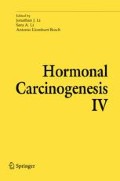Summary and Conclusions
Several conclusions can be reached from the data presented. (1). Id-1 protein is an important biomarker for PCA. (2). The level of its expression is related to the malignancy of the PCA. (3). Id-1 expression levels in PCA tissue samples has the potential to be used as a prognostic marker since high Id-1 expression is related to poor prognosis; and low expression to good prognosis. (4). One of the possible pathways for Id-1 gene action is through the inactivation of the p16/Rb tumor suppressor pathway. (5). The activation of the MAPK signaling pathway is a cell proliferation pathways induced by Id-1. (6). Activation of the Id-1 gene may be an important step in the transition stage of PCA cells from androgen-dependent to androgen-independent state, the most malignant form of PCA.
Access this chapter
Tax calculation will be finalised at checkout
Purchases are for personal use only
Preview
Unable to display preview. Download preview PDF.
References
Wang YZ, Wong YC (1998) Sex hormone induced prostatic carcinogenesis in the Noble rat: the role of insulin-like growth factor-1 (IGF-1) and vascular endothelial growth factor (VEGF) in the development of PCA Prostate 35:165–177.
Wong YC, Xie W, Tsao SW (2000) Structural changes and alteration in expression of TGF-beta1 and its receptors in prostatic intraepithelial neoplasia (PIN) in the ventral prostate of Noble rats. Prostate 45:289–298.
Tam NNC, Chung SSM, Lee DTW, et al (2000) Aberrant expression of hepatocyte growth factor and its receptor, c-Met, during sex hormone-induced prostatic carcinogenesis in Noble rat. Carcinogenesis 21:2183–2191.
Xie W, Wong YC, Tsao SW, et al (2000) Expression of a kallikrein-like protein in prostatic intraepithelial neoplasia in ventral prostate of the Noble rat. Prostate 42:8–17.
Wong YC, Tam NNC (2002) Dedifferentiation of stromal smooth muscle as a factor in prostate carcinogenesis. Differentiation 70:633–645.
Ouyang XS, Wang X, Lee DTW, et al (2001) Up-regulation of TRPM-2, MMP-7 and Id-1 during sex hormone-induced prostate carcinogenesis in the Noble rat. Carcinogenesis 22:965–973.
Benezra R, Davis RL, Lockshon D, et al (1990) The protein Id: a negative regulator of helix-loop-helix DNA binding proteins. Cell 61:49–59.
Desprez PY, Hara E, Bissell MJ, et al (1995) Suppression of mammary epithelial cell differentiation by helix-loop-helix protein Id-1. Mol Cell Biol 15:3398–3404.
Alani RM, Young AZ, Shifflett CB (2001) Id-1 regulation of cellular senescence through transcriptional repression of p16INK4a. Proc Natl Acad Sci USA 91:7812–7816.
Maruyama H, Kleeff J, Wildi S, et al (1999) Id-1 and Id-2 are overexpressed in pancreatic cancer and in dysplastic lesions in chronic pancreatitis. Am J Path 155:815–822.
Lin CQ, Singh J, Murata K, et al (2000) A role for Id-1 in the aggressive phenotype and steroid hormone response of human BC cells. Cancer Res 60:1332–1340.
Desprez PY, Lin CQ, Thomasset N, et al (1998) A novel pathway for mammary epithelial cell invasion induced by the helix-loop-helix protein Id-1. Mol Cell Biol 18:4577–4588.
Langlands K, Down GA, Kealey T (2000) Id proteins are dynamically expressed in normal epidermis and dysregulated in squamous cell carcinoma. Cancer Res 60:5929–5933.
Hara E, Yamaguchi T, Nojima H, et al (1994) Id-related genes encoding helix-loop-helix proteins are required for G1 progression and are repressed in senescent human fibroblasts. J. Biol Chem 269:2139–2145.
Barone MV, Pepperkok R, Peverali FA, et al (1994) Id proteins control growth induction in mammalian cells. Proc Natl Acad Sci USA 91:4985–4988.
Peverali FA, Ramqvist T, Saffrick R, et al (1994) Regulation of G1 progression by E2A and Id helix-loop-helix proteins. EMBO 13:4291–4301.
Ouyang XS, Wang X, Lee DTW, et al (2002) Overexpression of Id-1 in PCA. J Urol 167:2598–2602.
Ouyang XS, Wang X, Ling MT, et al (2002) Id-1 stimulates serum independent PCA cell proliferation through inactivation of p16INK4a/pRB pathway. Carcinogenesis 23:721–725.
Ohtani N, Zebedee Z, Huot TJ, et al (2001) Opposing effects of Ets and Id proteins on p16INK4a expression during cellular senescence. Nature 409:1067–1070.
Tournay O, Benazra R (1996) Transcription of the dominant-negative helixloop-helix protein Id1 is regulated by a protein complex containing the immediate early response gene Egr-1. Mol Cell Biol 16:2418–2430.
Eid MA, Kumar MV, Iczkowski KA, et al (1998) Expression of early growth response genes in human PCA. Cancer Res 58: 2461–2468.
Gioeli D, Mandell JW, Petroni GR, et al (1999) Activation of mitogenactivated protein kinase associated with PCA progression. Cancer Res 59:279–281.
Ling MT, Wang X, Ouyang XS, et al (2002) Activation of MAPK signaling pathway is essential for Id-1 induced serum independent PCA cell growth. Oncogene 21:8498–8505.
Dudley DT, Pang L, Decker SJ, et al (1995) A synthetic inhibitor of the mitogen-activated protein kinase cascade. PNAS USA 92:7686–7689.
Kawashita Y, Ohtsurau A, Kaneda Y, et al (1999) Regression of hepatocellular carcinoma in vitro and in vivo by radiosensitizing suicide gene therapy under the inducible and spatial control of radiation. Hum Gene Ther 10:1509–1519.
Ling MT, Chan KW, Choo CK (2001) Androgen induces differentation of a human paillomavirus 16 E6/E7 immortalized prostate epithelial cell line. J. Endocrinol. 170:287–296.
Author information
Authors and Affiliations
Editor information
Editors and Affiliations
Rights and permissions
Copyright information
© 2005 Springer Science+Business Media, Inc.
About this chapter
Cite this chapter
Wong, Y.C., Ling, M.T., Wang, X.H., Ouyang, X.S., Cheung, A.L.M., Chan, F.L. (2005). Id-1 Protein as a New Marker for PCA. In: Li, J.J., Li, S.A., Llombart-Bosch, A. (eds) Hormonal Carcinogenesis IV. Springer, Boston, MA. https://doi.org/10.1007/0-387-23761-5_16
Download citation
DOI: https://doi.org/10.1007/0-387-23761-5_16
Publisher Name: Springer, Boston, MA
Print ISBN: 978-0-387-23783-1
Online ISBN: 978-0-387-23761-9
eBook Packages: MedicineMedicine (R0)

